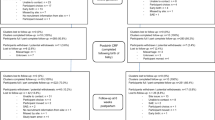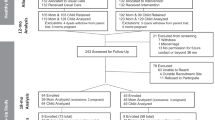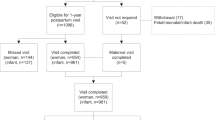Abstract
BACKGROUND: The Institute of Medicine (IOM) recommends that normal‐weight women (BMI (body mass index) of 19.8–26.0) gain 25–35 lb (11.4–15.9 kg) during pregnancy, and that overweight women (BMI of 26.1–29.0) gain 15–25 lbs (6.8–11.4 kg). A significant number of normal‐weight women and an even greater proportion of overweight women exceed these guidelines, which increases postpartum weight retention and may contribute to the development of obesity.
OBJECTIVE: To determine whether a stepped care, behavioral intervention will decrease the percentage of women who gain more than the IOM recommendation.
DESIGN: Randomized controlled trial comparing a stepped-care behavioral intervention with usual care. Women (n=120) who had a BMI>19.8, age>18 and <20 weeks gestation were recruited from a hospital-based clinic serving low-income women and randomized by race and BMI category to the intervention or control group. The intervention group received education about weight gain, healthy eating, and exercise and individual graphs of their weight gain. Those exceeding weight gain goals were given more intensive intervention. Women were followed through pregnancy to their first postpartum clinic visit. The main outcome measure was weight gain during pregnancy categorized as above the IOM recommendations vs below or within the IOM recommendations.
RESULTS: The intervention significantly decreased the percentage of normal-weight women who exceeded the IOM recommendations (33 vs 58%, P<0.05). There was a non-significant (P=0.09) effect in the opposite direction among overweight women (59% of intervention and 32% of control gained more than recommended). Postpartum weight retention was strongly related to weight gain during pregnancy (r=0.89).
CONCLUSIONS: The intervention reduced excessive weight gain during pregnancy among normal weight women.
This is a preview of subscription content, access via your institution
Access options
Subscribe to this journal
Receive 12 print issues and online access
$259.00 per year
only $21.58 per issue
Buy this article
- Purchase on Springer Link
- Instant access to full article PDF
Prices may be subject to local taxes which are calculated during checkout



Similar content being viewed by others
References
Lederman SA . Recent issues related to nutrition during pregnancy J Am Coll Nutr 1993 12: 91–100.
Parker JD, Abrams B . Prenatal weight gain advice: an examination of the recent prenatal weight gain recommendations of the Institute of Medicine Obstet Gynecol 1992 79: 664–669.
Keppel KG, Taffel SM . Pregnancy-related weight gain and retention: implications of the 1990 Institute of Medicine guidelines Am J Public Health 1993 83: 1100–1103.
Scholl TO, Hediger ML, Schall JI, Ances IG, Smith WK . Gestational weight gain, pregnancy outcome, and postpartum weight retention Obstet Gynecol 1995 86: 423–427.
Carmichael S, Abrams B, Selvin S . The pattern of maternal weight gain in women with good pregnancy outcomes Am J Public Health 1997 87: 1984–1988.
Scholl TO, Hediger ML, Ances IG, Belsky DH, Salmon RW . Weight gain during pregnancy in adolescence: Predictive ability of early weight gain Obstet Gynecol 1990 75: 948–953.
Muscati SK, Gray-Donald K, Koski KG . Timing of weight gain during pregnancy: promoting fetal growth and minimizing maternal weight retention Int J Obes 1996 20: 526–532.
Rossner S, Ohlin A . Pregnancy as a risk factor for obesity: lessons from the Stockholm pregnancy and weight development study Obes Res 1995 3 (Suppl 2): 267s–275s.
Block G, Clifford C, Naughton MD, Henderson M, McAdams M . A brief dietary screen for high fat intake J Nutr Educ 1989 21: 199–207.
Paffenbarger RS Jr., Hyde RT, Wing AL, Hsieh C-C . Physical activity, all-cause mortality, and longevity of college alumni New Engl J Med 1986 314: 605–613.
Harris HE, Ellison GTH, Holliday M, Lucassen E . The impact of pregnancy on the long-term weight gain of primiparous women in England Int J Obes Relat Metab Disord 1997 21: 747–755.
Smith DE, Lewis CE, Caveny JL, Perkins LL, Burke GL, Bild DE . Longitudinal changes in adiposity associated with pregnancy JAMA 1994 271: 1747–1751.
Williamson DF, Madans J, Pamuck E, Flegal KMk, Kendrick JS, Serdula MK . A prospective study of childbearing and 10-year weight gain in US white women 25 to 45 years of age Int J Obes Relat Metab Disord 1994 18: 561–569.
Rookus MA, Rokebrand P, Burema J, Deurenberg P . The effect of pregnancy on the body mass index 9 months post-partum in 49 women Int J Obes 1987 11: 609–618.
Rossner S . Pregnancy, weight cycling and weight gain Int J Obes 1992 16: 145–147.
Williamson DF, Kahn HS, Remington PL, Anda RF . The 10-year incidence of overweight and major weight gain in US adults Arch Intern Med 1990 150: 665–672.
Gunderson EP, Abrams B, Selvin S . The relative importance of gestational gain and maternal characteristics associated with the risk of becoming overweight after pregnancy Int J Obes Relat Metab Disord 2000 24: 1660–1668.
Hunt SC, Daines MM, Adams TD, Heath EM, Williams RR . Pregnancy weight retention in morbid obesity Obes Res 1995 3: 121–130.
Schauberger CW, Rooney BL, Brimer LM . Factors that influence weight loss in the puerperium Obstet Gynecol 1992 79: 424–429.
Parham ES, Astrom MF, King SH . The association of pregnancy weight gain with the mother's postpartum weight J Am Diet Assoc 1990 90: 550–554.
Algert S, Shragg P, Hollingsworth DR . Moderate caloric restriction in obese women with gestational diabetes Obstet Gynecol 1985 65: 487–491.
Coetzee EJ, Jackson WPU, Berman PA . Ketonuria in pregnancy—with special reference to calorie-restricted food intake in obese diabetics Diabetes 1980 29: 177–181.
Maresh M, Gillmer MDG, Beard RW, Alderson CS, Bloxham BA, Elkeles RS . The effect of diet and insulin on metabolic profiles of women with gestational diabetes mellitus Diabetes 1985 34 (Suppl 2): 88–93.
Dornhurst A, Nicholls SD, Probst F et al. Calorie restriction for treatment of gestational diabetes Diabetes 1991 40 (Suppl 2): 161–164.
Lichtman SW, Pisarka K et al. Discrepancy between self-reported and actual caloric intake and exercise in obese subjects New Engl J Med 1992 327: 1893–1898.
Harris HE, Ellison GTH, Clement S . Do the psychosocial and behavioral changes that accompany motherhood influence the impact of pregnancy on long-term weight gain Obstet Gynecol 1999 20: 65–79.
Stevens-Simon C, Roghmann KJ, McAnarney ER . Relationship of self-reported pre-pregnant weight and weight gain during pregnancy to maternal body habitus and age J Am Diet Assoc 1992 92: 85–87.
Adair LS, Pollitt E, Mueller WH . The Bacon Chow study: Effect of nutritional supplementation on maternal weight and skinfold thicknesses during pregnancy and lactation Br J Nutr 1984 51: 357–369.
Rush D, Sloan NL, Leighton J et al. Longitudinal study of pregnant women Am J Clin Nutr 1988 48: 439–483.
Lovelady CA, Garner KE, Moreno KL, Williams JP . The effect of weight loss in overweight, lactating women on the growth of their infants New Engl J Med 2000 342: 449–453.
Leermakers EA, Anglin K, Wing RR . Reducing postpartum weight retention through a correspondence intervention Int J Obes Relat Metab Disord 1998 22: 1103–110.
Acknowledgements
We wish to thank Cathy DeBranski, RN-C for her help in recruiting and scheduling participants for this study. This work was funded by a grant from Magee-Womens Health Foundation; Magee-Womens Research Institute awarded to Dr Wing.
Author information
Authors and Affiliations
Corresponding author
Rights and permissions
About this article
Cite this article
Polley, B., Wing, R. & Sims, C. Randomized controlled trial to prevent excessive weight gain in pregnant women. Int J Obes 26, 1494–1502 (2002). https://doi.org/10.1038/sj.ijo.0802130
Received:
Revised:
Accepted:
Published:
Issue Date:
DOI: https://doi.org/10.1038/sj.ijo.0802130
Keywords
This article is cited by
-
The effect of motivational interviewing and/or cognitive behaviour therapy techniques on gestational weight gain – a systematic review and meta-analysis
BMC Public Health (2023)
-
The effect of the 2009 revised U.S. guidelines for gestational weight gain on maternal and infant health: a quasi-experimental study
BMC Pregnancy and Childbirth (2023)
-
Incorporating Skills for Managing Mood, Stress, and Sleep into a Gestational Weight Gain Intervention
Journal of Contemporary Psychotherapy (2023)
-
Supporting women of childbearing age in the prevention and treatment of overweight and obesity: a scoping review of randomized control trials of behavioral interventions
BMC Women's Health (2020)
-
Sequential Introduction of Exercise First Followed by Nutrition Improves Program Adherence During Pregnancy: a Randomized Controlled Trial
International Journal of Behavioral Medicine (2020)



